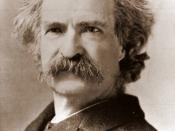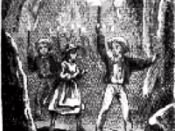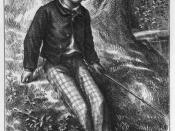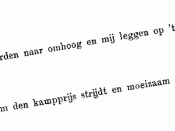When literary audiences first read The Adventures of Tom Sawyer, they hailed Mark Twain as a link to Mississippi culture, a fresh voice that spoke for all of America. But one can argue that tales such as The Adventures of Tom Sawyer have since fallen from relevancy due to the fast paced and technology-based mode of living most Americans pursue today. Looking beyond the mask of the time period, a reader can grasp much more than a feel for post-colonial America. While the culture and setting no longer exist, the themes present in his story still pertain to modern American society. TwainÃÂs tale of adventure inlays basic morals and social criticisms within exciting ventures, allowing his story to remain timeless for as long as human society persists.
Adolescence is a sometimes awkward time of exploration and growth that everyone must experience. While some never fully mature, Tom and Huck show that attaining maturity is not a hopeless feat.
When Tom and Huck witness Injun Joe framing Muff Potter for the murder of Dr. Robinson, they begin a process of conscience realization. Primarily worrying that if they snitch on Injun Joe, he will target them, they promise not to tell a single soul. Under moonlight, the boys perform a blood ritual that vows them to an oath of silence. (Twain 76-79) Later in the story, when Muff PotterÃÂs trial approaches, guilt starts to eat away at Tom and Huck. They reflect upon Muff PotterÃÂs good deeds and come to comprehend the horror of letting an innocent man hang because of their cowardly fears. (Twain 167) During the trial, Muff PotterÃÂs lawyer calls Tom to the stand where he relays his account of the night Injun Joe murdered Dr. Robinson to the courthouse. The incriminating testimonial sets Muff Potter free, and Tom feels relieved that he stood up for Muff PotterÃÂs innocence. (Twain 172-174) Once again, the town hails Tom as a hero, but this time for the maturity he displays in proclaiming the truth, despite the threat of death posed by Injun Joe. Today we still honor those who declare the truth. Lying or concealing the truth has always and will forever be considered a sin to our Christian majority America. In Tom SawyerÃÂs time, when religion governed oneÃÂs actions, hiding the truth would be an especially grievous offence to oneÃÂs faith. With TomÃÂs honesty, Twain captured the ruling moral thought of Americans.
Appearances, as we know, are not always what they seem to be. In todayÃÂs American society, deception can come in many different forms, from phrases like ÃÂall naturalÃÂ on a can of soda to the plastic surgery procedures countless numbers find refuge in. In Tom SawyerÃÂs world, deception comes in the form of hypocrisy. Twain satirizes the dual truths prescribed by the church, school, and society in general. In TomÃÂs Sunday school, students who memorize two thousand Bible verses are rewarded with a Bible, not in hopes to strengthen the studentsÃÂ faith, but to present their knowledge to the judge. One would not expect an institution as virtuous as a Sunday school to have motives differing from instilling faith in children. The gentlemen, ladies, girls, and boys ÃÂshow offÃÂ for the judge who likewise ÃÂshows offÃÂ to the Sunday school. Mr. Walters throws meaningless orders around, the librarian runs amuck with imaginary duties, the teachers fuss over the students excessively, and the children twiddle their thumbs and act like little angels. (Twain 33-34) Similarly, the school runs an extravagant end of the year ÃÂexamination.ÃÂ Parents of students and town bigwigs gather in the elaborately decorated schoolhouse to view maudlin works performed by students. (Twain 154-158) Americans then and now have witnessed attempts to exaggerate worth. Twain excelled in capturing hypocrisy with religion and education; due to the fact that these establishments have remained sedentary figures of the ÃÂinflated ego.ÃÂ We are all too familiar with the overblown image of prestigious schools and the peaceful pretense put on by religious crusaders. Twain saw this phoniness in American society and realized that it would stay a problem for years to come.
In America ÃÂthe outsiderÃÂ is feared. Whether it occurs on a playground or in the workforce, those inside the social circle belittle the outsider for either not fitting into or reforming to the requisite social mold. Injun Joe, Jim, Muff Potter, and Huck all fall into the outsider category. Injun Joe and Jim grew up knowing oppression due to their racial backgrounds. In Injun JoeÃÂs case, his treatment as an outcast leads him to kill. The motivation for Dr. RobinsonÃÂs murder stems from regarding Injun Joe as an outcast, which results in Injun JoeÃÂs incarceration as a vagrant. (Twain 75) In todayÃÂs world, the slightest cultural tension can explode into a conflict of massive proportions. In 2005, a series of Danish comics portrayed Allah, a serious oversight. A number of Muslims around the world proceeded to boycott Danish goods and threaten the lives of those who drew them. Besides racial strains, unwillingness to conform to societies norms automatically places someone on the outside. Muff Potter, a raging alcoholic, and Huck Finn, an uncivilized rascal leaves them on the outside. ÃÂHuckleberry was cordially hated and dreaded by all the mothers of the town, because he was idle, and lawless and vulgar and bad.ÃÂ (Twain 47)TwainÃÂs satire of society speaks to everyone who reads it. The Adventures of Tom Sawyer addresses the same issues people still face today. Twain cleverly grasped problems that would endure the test of time. Despite a 250 year culture gap, the themes are still relevant to modern life. While Twain states that he wrote his tale for little boys and girls, he offers adults criticism. Mocking society will never go out of style. Twain spoke for those who wanted to speak but could not speak, acting as the omnipresent voice of America.





